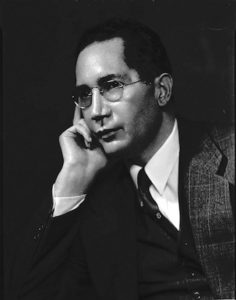
Sterling A. Brown
Sterling Brown was born on this date in 1901. He was a Black English professor and literary critic whose poetry was rooted in folklore sources and Black dialect.
Sterling Allen Brown was born in Washington, D. C., the son of a professor at Howard University. His father, Reverend Sterling Nelson Brown, was born a slave but attended Fisk University and Oberlin College. He became a pastor and later a professor of religion at Howard. His mother was also a graduate of Fisk University.
After graduating from Dunbar High School, young Brown received an academic scholarship to Williams College, where he studied traditional literature. He also explored blues and jazz music (still considered socially illegitimate). Brown graduated from Williams in 1922, Phi Beta Kappa, and with a scholarship, entered graduate school and received his Master's degree from Harvard University in 1923.
While teaching, he also began collecting folk songs and stories from Black people. The people he met also served as the subject of his poetry. In 1929, Brown began a 40-year teaching career at Howard, and in 1932, his first volume of poetry, "Southern Road," was published. His work primarily influenced musical forms, especially ballads, work songs, spirituals, and blues.
In 1937, he was put in charge of the Federal Writers Project (FWP) Slave Narratives Project, from which position he insisted on hiring African American interviewers. He also oversaw some of the FWP's state guides, particularly Florida's, where he collaborated with Zora Neale Hurston and Stetson Kennedy in getting the story of the Rosewood "race riot" reinserted in a text which had been excised by the Florida state (white) officials.
At a time when white writers had distorted black dialect into a stereotype, he boldly used authentic dialect and phonetic spelling in his poems. Though "Southern Road" was widely praised, Brown found no publisher for his second collection, "No Hiding Place"; it eventually was incorporated into his "Collected Poems" (1980).
As a critic, essayist, and "Opportunity" magazine columnist, he supported realistic writing and harshly attacked literature that distorted Black life. In 1937, he published the pioneering studies "Negro Poetry and Drama" and "The Negro in American Fiction." In 1941, he was co-editor of "The Negro Caravan," an anthology of African American writing. Sterling A. Brown died on Jan. 17, 1989. Most of his major work was written by the mid-1940s; two decades later, students inspired a widespread revival of interest in his work, much of which was reprinted.
The African American Atlas
Black History & Culture an Illustrated Reference
by Molefi K. Asanta and Mark T. Mattson
Macmillan USA, Simon & Schuster, New York
ISBN 0-02-864984-2
Peter Rachleff
Professor of History
Macalester College, St. Paul, Minnesota